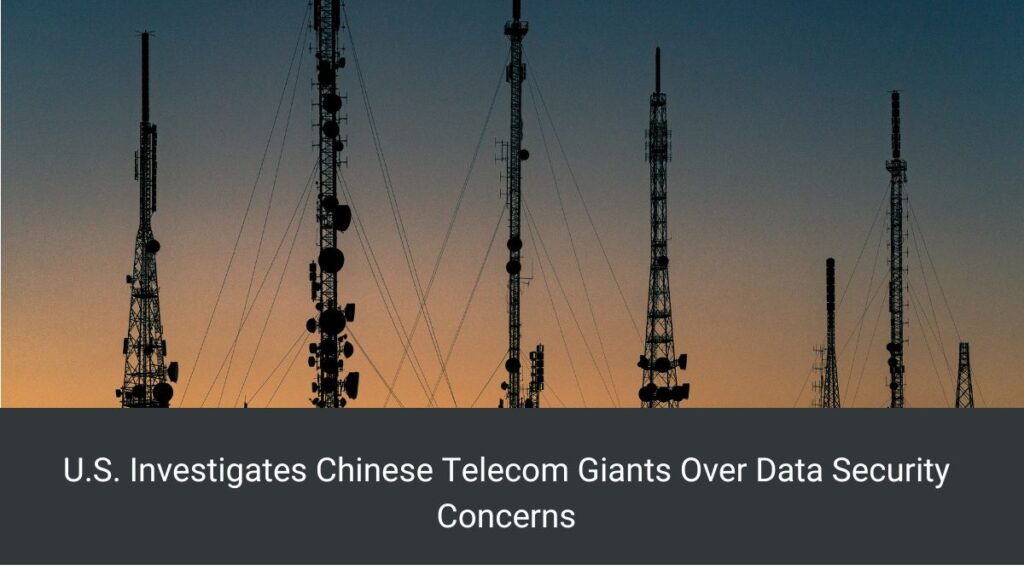In a significant development underscoring ongoing geopolitical tensions, the Biden administration has initiated an investigation into China Mobile, China Telecom, and China Unicom. The probe, conducted by the Commerce Department, focuses on potential risks associated with these companies’ operations within the United States, particularly their cloud and internet services. The concern revolves around the possibility of these state-backed entities exploiting their access to American data, potentially compromising national security interests.
Background and Scope of the Investigation
The investigation, which has not been publicly disclosed until now, involves subpoenas issued to China Mobile and China Telecom, with China Unicom also under scrutiny. These telecom giants, despite regulatory restrictions preventing them from offering telephone and retail internet services in the U.S., maintain operations in cloud services and routing wholesale internet traffic. Such activities grant them access to sensitive data of American citizens and businesses.
Regulatory Actions and Concerns
Previously, the Federal Communications Commission (FCC) has taken steps to curtail these companies’ activities in the U.S. In 2019, China Mobile’s application to provide telephone services was denied, followed by the revocation of China Telecom and China Unicom’s licenses for similar services in subsequent years. The FCC cited national security risks, emphasizing instances where internet traffic was misrouted through China, potentially exposing it to interception or manipulation by foreign entities.
National Security Implications
The core concern of U.S. regulators lies in the implications of these companies’ access to critical internet infrastructure, including Points of Presence (PoPs) at major internet exchange points. PoPs facilitate the exchange of data between large networks, raising alarms about potential vulnerabilities such as data interception and manipulation. Experts warn that such access could enable metadata analysis and even deep packet inspection, posing significant risks to data security and privacy.
The Role of Commerce Department and Future Implications
The Commerce Department’s investigation is multifaceted, encompassing not only the operational aspects of these companies but also their ownership of data centers. Of particular interest is China Mobile’s ownership stake in a data center located in California’s Silicon Valley, highlighting concerns over data integrity and security. The investigation underscores broader efforts by the U.S. government to mitigate risks associated with Chinese technological influence and safeguard American interests.
Industry Responses and Geopolitical Context
In response to inquiries, the Chinese Embassy in Washington has criticized the investigation, labeling it as an unjust suppression of Chinese companies. However, U.S. authorities maintain that the measures are necessary to prevent potential exploitation of American data by foreign adversaries. The investigation is part of a broader strategy amidst escalating tensions between the U.S. and China, encompassing economic, technological, and security dimensions.
Balancing Innovation and Security
As the investigation progresses, the outcome could have significant ramifications for the future of Chinese telecommunications firms operating in the U.S. market. Regulatory decisions stemming from this probe may restrict these companies’ ability to compete in American-facing cloud and internet services, affecting their global market presence. For stakeholders in both countries, the evolving landscape underscores the delicate balance between fostering technological innovation and ensuring robust safeguards against national security threats.
The ongoing scrutiny reflects broader geopolitical dynamics, where technological advancements intersect with national security imperatives. Moving forward, navigating these complexities will require nuanced policy decisions that uphold both innovation and security in the digital age.
While the investigation into China Mobile, China Telecom, and China Unicom remains ongoing, its implications extend beyond regulatory compliance to encompass strategic considerations in a rapidly evolving global landscape. As stakeholders await further developments, the need for comprehensive, forward-looking policies to address emerging threats in cyberspace becomes increasingly evident.

